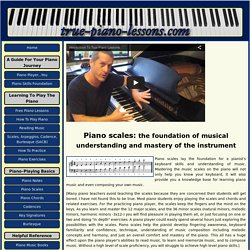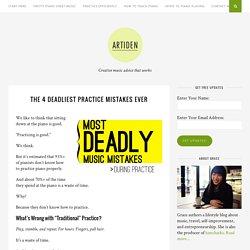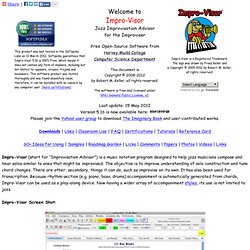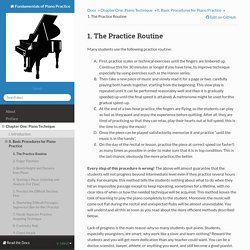

Livres, méthodes. Répertoire et improvisation. Gammes, arpèges et technique. Sante et pratique musicale. Cours de qualite en ligne. Transcriptions de solos. Online Jazz Piano Lessons. Piano. Piano Scales. Piano scales lay the foundation for a pianist’s keyboard skills and understanding of music.

Mastering the music scales on the piano will not only help you know your keyboard, it will also provide you a knowledge base for learning piano music and even composing your own music. [Many piano teachers avoid teaching the scales because they are concerned their students will get bored. I have not found this to be true. Most piano students enjoy playing the scales and chords and related exercises. For the practicing piano player, the scales keep the fingers and the mind on the keys. The following pages offer a resource for pianists of all levels. A beginner should go through, learning and mastering these elements in the order presented here. For a more complete understanding of how to build your piano-playing foundation, read "Piano Player... For the most direct, organized, and progressive path to learning to play the piano, start. Rock Piano Chops Lesson by Mark Harrison. Softly, As In A Morning Sunrise – Wynton Kelly Piano Solo Transcription.
Softly, As in a Morning Sunrise - Wynton Kelly's Solo. Solos transcriptions. Ten Piano Practice Tips with Jonathan Plowright. Many people love to practise the piano – personally, I don’t enjoy it at all!

For me it is purely a means to an end, which will hopefully be a memorable concert performance or recording. That's why I need to achieve as much as I can, as efficiently as possible and in the shortest space of time. So, over the years, I have developed a way of working which suits this philosophy. Whether you are a student or an enthusiastic amateur, (and whether you love or loathe practising!) I hope these following pointers will be useful for you and help make your time at the piano more productive.
Editor's note: Jonathan Plowright made his Australian debut in July and August this year at the Australian Festival of Chamber Music. My first tip, of course, being: 1. Everyone is different and we all have limitations when it comes to concentration. 2. If you feel the day’s practice is going well, don’t do any longer than you would normally or go on any later in the day – you will only tire yourself. 3. 4. 5. The 4 Deadliest Practice Mistakes Ever - Artiden. We like to think that sitting down at the piano is good.

“Practicing is good.” We think. But it’s estimated that 93%+ of pianists don’t know how to practice piano properly. USC JAZZ TRANSCRIPTIONS. Vidéos impro piano. Welcome to Impro-Visor. Last update: 15 May 2012 Version 5.16 is now available here: Please join the Yahoo!

User group to download The Imaginary Book and user-contributed works. What would be a good piano practice routine? - Quora. Cf7540161121eee3c5a9a72df4ea5d47. 1. The Practice Routine — Fundamentals of Piano Practice. Many students use the following practice routine: First, practice scales or technical exercises until the fingers are limbered up.

Continue this for 30 minutes or longer if you have time, to improve technique especially by using exercises such as the Hanon series.Then take a new piece of music and slowly read it for a page or two, carefully playing both hands together, starting from the beginning. This slow play is repeated until it can be performed reasonably well and then it is gradually speeded up until the final speed is attained.
A metronome might be used for this gradual speed-up.At the end of a two hour practice, the fingers are flying, so the students can play as fast as they want and enjoy the experience before quitting. After all, they are tired of practicing so that they can relax, play their hearts out at full speed; this is the time to enjoy the music! Every step of this procedure is wrong! 3 Uncommon Tips For Practicing Jazz Piano Technique. When most of us think about practicing jazz piano technique we usually think of the same old boring exercises that piano players have been playing for countless years.

Things like scale practice, arpeggios, Hanon exercises, and playing classical pieces. Now, to be fair these technique studies can be useful in certain ways but they don’t seem to be a direct path to help us become better jazz musicians. 5_Essential_PS. 8 Jazz Standards To Practice Like an Etude. Every musician has spent time in the practice room working on etudes… Diligently running through exercises that cover various techniques like articulation, the altissimo range, or diminished arpeggios.

This is a good start for most players, but where does the jazz musician turn to develop the techniques that are essential for improvisation? After all jazz is a music that you learn by ear, not from a dusty book of exercises… Well the answer can be found in an unlikely place: the repertoire of jazz standards that we’re all expected to learn. By using jazz standards as your etudes, you’ll kill two birds with one stone: learning tunes and developing the techniques necessary for jazz improvisation.
Below we’ll show you how to turn 8 jazz standards into the daily practice etudes that will transform your skills as an improviser. Before you get started, listen to the YouTube clip of each tune. Ready to go? 1) Moving from Major to minor: Ornithology Audio Player. 10_improvisor_tips1.